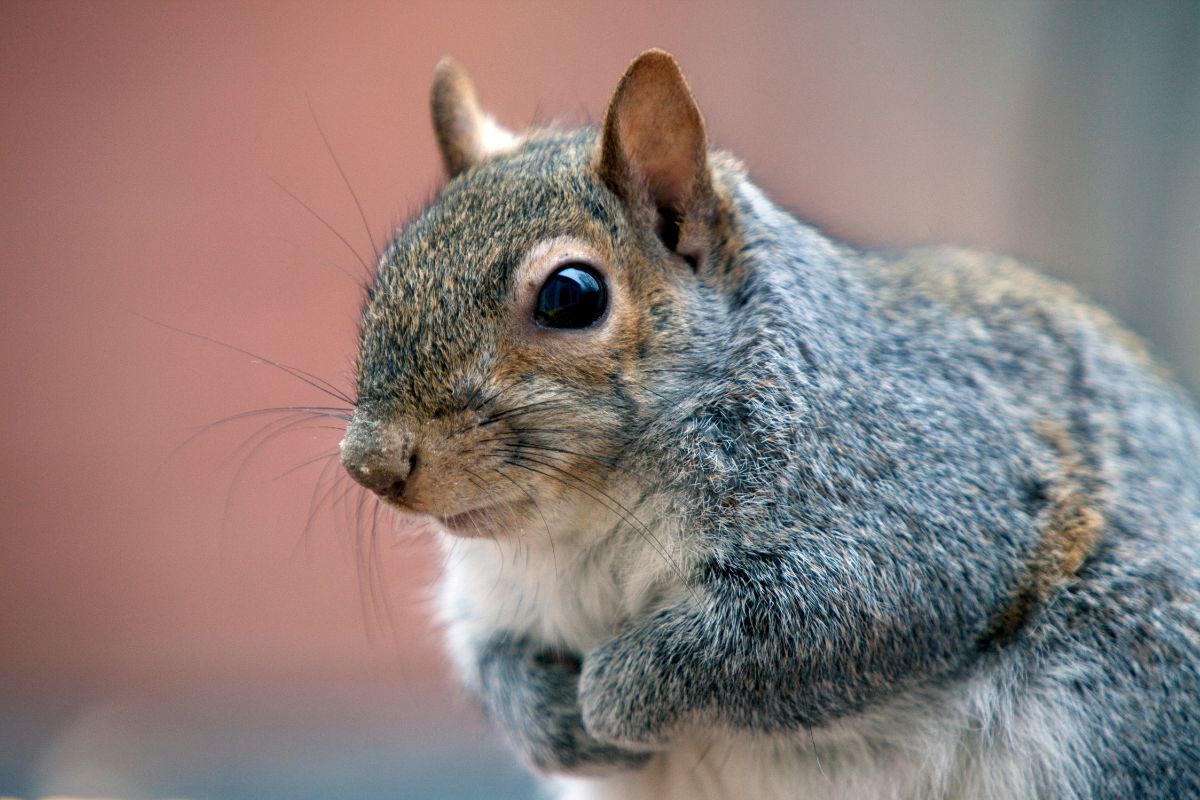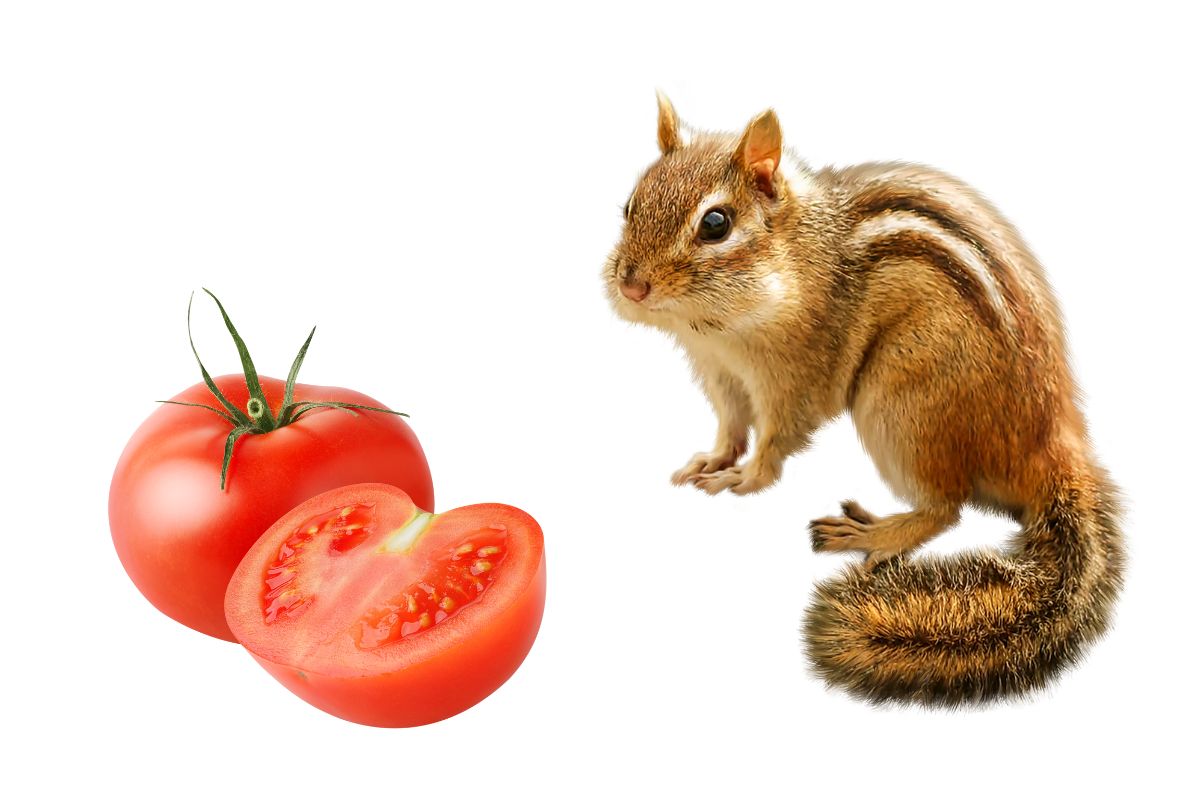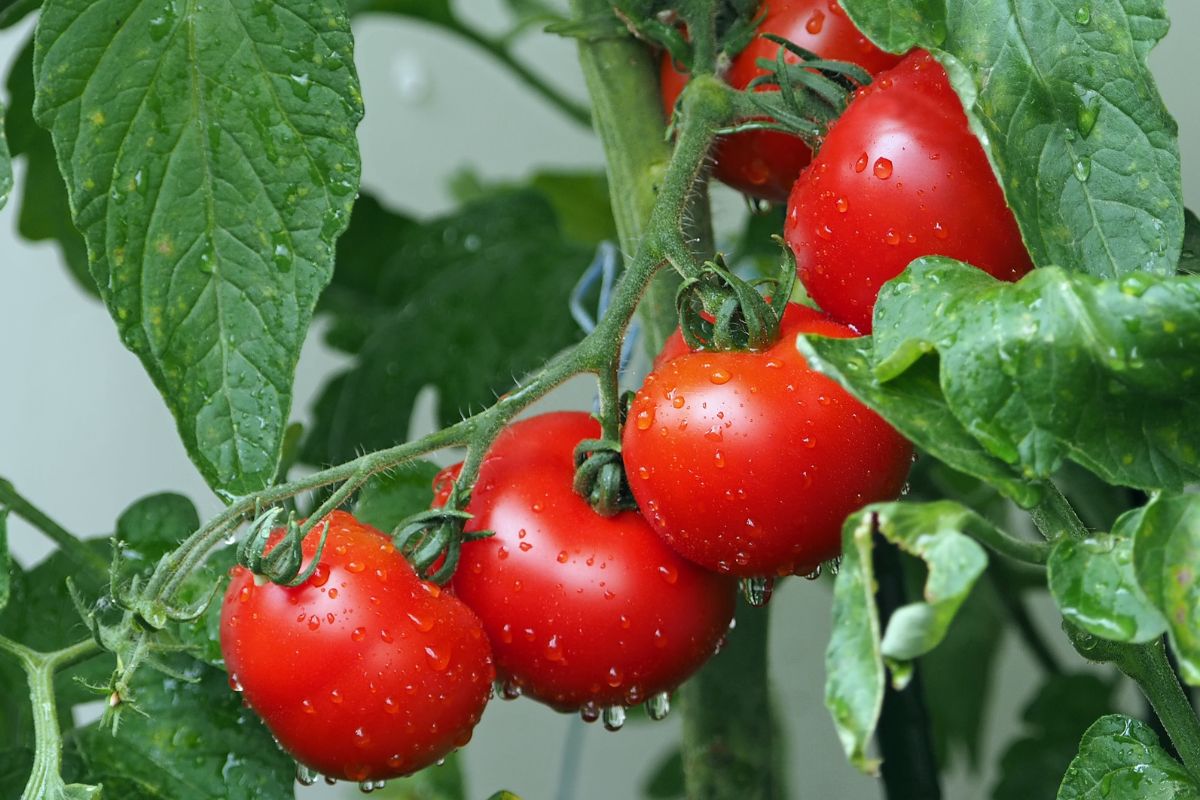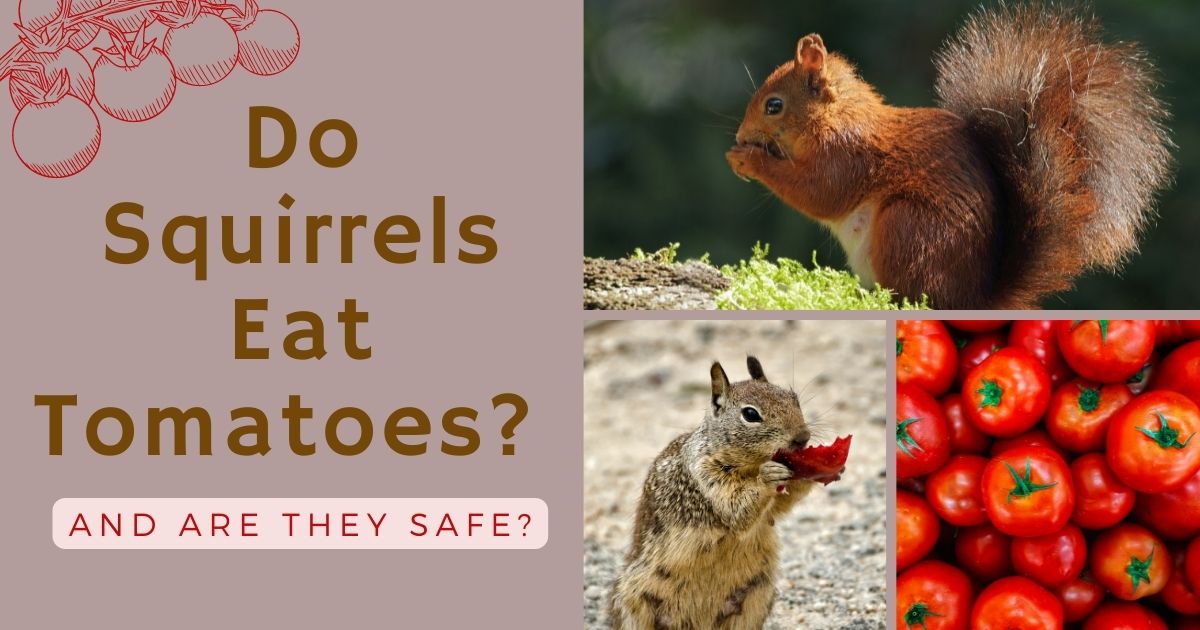Squirrels and Tomatoes
Do squirrels eat tomatoes? Sometimes, a squirrel may consume an entire tomato, but more often than not, they will take bites out of many tomatoes, destroying all of them for you to eat. This behavior gives the appearance of being nasty.
Since squirrels are not nocturnal, another mammal is probably to blame for any damage discovered in the morning. Squirrels are only active during the day. Read on to understand more about squirrels and tomatoes.

Do Squirrels Eat Tomatoes?
Squirrels are fascinating animals. They eat a variety of items that you might not anticipate, and they have some peculiar feeding habits. Despite being a nuisance to the ordinary gardener, squirrels can be interesting to observe. Although squirrels are omnivores and will consume many popular garden plants and insects, can squirrels eat tomatoes?
Yes, squirrels do consume tomatoes from the communal garden. Occasionally, squirrels will consume the entire tomato, but most of the time, they will consume a little portion of the fruit, leaving the remainder behind. Additionally, they might remove the tomato off the vine and eat it outside the garden, where they feel safe.
When you go out to check on your vegetables as a gardener, you could notice bite marks on the tomatoes. Numerous offenders might be consuming the tomatoes. How they consume your tomatoes usually gives you a fair sense of the animal munching on them. Squirrels will consume on-vine tomatoes.
But what makes having squirrels in your garden so unpleasant is that they frequently eat one tomato off the vine before moving on to the next. They can quickly and easily destroy an entire tomato plant. Typically, squirrels won’t consume rotten tomatoes.
Due to their excellent sense of smell, squirrels can distinguish between ripe tomatoes and those that aren’t yet fit for consumption. The pungent stench of rotten tomatoes would probably dissuade most squirrels from munching on them. However, if food supplies were low and a squirrel was starving, it might pick a rotten tomato.
Yes, occasionally, squirrels will consume green tomatoes. The squirrels usually wait until the tomatoes are fully ripe before taking them off the vine. Still, sometimes the temptation is too great, and they steal the tomatoes before they are ready. However, they typically don’t consume the entire green tomato.
They might eat one or two bites before continuing. Some garden bugs will consume the tomato. One evening you may have wonderful tomatoes, but your tomatoes may be completely gone the next morning. Squirrels are not usually the ones that do this.
Gardeners have discovered that squirrels may occasionally finish a ripe tomato after taking one or two bites off of it. The squirrel will yank the fruit from the vine and carry it with them, especially cherry and grape tomatoes. Squirrels favor the tomato’s luscious skin.
Because of this, many gardeners frequently discover tomatoes with holes in them after a squirrel has eaten one and moved on to the next tomato. On occasion, the squirrel will consume the whole fruit. Because squirrels have teeth designed for gnawing, they can easily bite through a juicy tomato. Consider how the squirrel cracks open acorns and walnuts.
Those teeth serve multiple functions to aid the squirrel in finding various types of food. They are ideal for eating delicate fruits and tomatoes. Squirrels might go up and eat the tomatoes straight off the plant.
How to Protect Tomatoes From Squirrels
Squirrels are just as common a feature of the landscape in many locations as trees are. Therefore, although you can try to keep squirrels out of tomatoes, it is typically preferable (and more realistic) to outsmart them instead. If you want a squirrel-proof vegetable garden, try some of these methods.
However, remember that what works for one squirrel species may not work for another. Make use of a variety of strategies to achieve the greatest possible results.
Take Away the Things That Interest Them
The sight and smell of fruit, nuts, and seeds that have fallen to the ground can entice squirrels to your yard to feed. Ensure that you remove these items from underneath the trees and bird feeders. To prevent squirrels from rummaging through your waste and finding tasty snacks, check the fit of the lids on your trash cans.
Drive Them Away
If you search the internet, you can find many different recipes that will keep squirrels away. Some include capsaicin, the chemical responsible for hot peppers’ fiery quality. Other options include peppermint oil, vinegar, or a mixture of the two of these substances. Gardeners have a wide range of success stories regarding these home brews.
Apply these sprays again after it has rained, but avoid spraying any part of the plant you wish to consume. Commercial repellent granules and sprays are also available. Read our article and find out The Best Skunk Repellant.
Distract Them From Their Focus
Place fake food stations in an isolated part of your yard, well away from planting beds and edible crops. These phony food stations should include items that squirrels enjoy eating, such as sunflower seeds, peanuts, and feed corn. To provide food for the squirrels, some gardeners even plant a few extra tomatoes near these spots.
Make sure your pit stop for the squirrel has some water. A word of caution: putting out food and water might attract other animals to your yard, so think carefully about whether or not it’s worth it before you do it.
Put Them in Fear
The presence of a dog or cat in the yard will terrify squirrels and prevent them from making your yard their home. If you teach your dog to hunt after squirrels, you won’t have nearly as many issues with these invasive rodents. You don’t have a pet, do you? The next step is to scatter vials of predator pee (such as that of a wolf or tiger) throughout your garden.
All kinds of animals, including squirrels, rabbits, and deer, become frightened when they smell the odor. If you use urine to spray on, you will need to reapply it after it rains. Motion-activated sprinklers may keep squirrels away for a while, but you shouldn’t count on them to do the job alone.
Pinwheels, old compact disks, or repurposed aluminum pie tins are hung from poles throughout the garden. This is specifically to create a sense of noise and movement. You can insert them into newly planted areas.
It may work until the plants have developed past the seedling stage, when squirrels lose interest (unless you are planting tomatoes). However, this is not always the case.
Keep Away From Them
Installing a cage or cover over your plants and beds will prevent squirrels from accessing them. You can achieve protection using various materials. These include hardware cloth, plastic bird netting, chicken wire, and summer-weight row coverings.
Make a protective enclosure for a single plant by constructing a cage out of hardware cloth or chicken wire. Cover it with plastic bird netting; use clothespins to keep it in place. Be sure to guard your crop.
Cover Bare Soil
Mulching uncovered dirt in seed beds and around newly planted seedlings is one tactic many gardeners use to deter squirrels from digging in their gardens.
Invite Predators
Squirrels are prey for hawks and numerous different kinds of owls. Do some research to discover which species are native to your region and find out what you can do to entice them.
Getting Rid of Squirrels Naturally
If you wish to get rid of your squirrels in a natural way and without causing any harm to them, the following are some suggestions:
- Refrain from feeding them because doing so encourages them to return for more, leading to confusion over what is permissible and what is not.
- To ensure the safety of your plants, cover them with netting.
- Cover the ground with mulch or another material of your choice.
- Make it a priority to keep an eye on the developing scenario and make adjustments as required.
- Get a dog.
- Use companion plants.
- As a deterrent for the squirrels, set up fake owls made of plastic all over the property in various locations.
- Install a sprinkler system; they won’t like sprays, so they’ll avoid the area when it’s active.
- Use pee from predators; you may purchase predator urine and then pour it around the area; this will cause them to avoid the area since they can smell the urine.
- You should do scattered grinds from used coffee cups around each plant.
- Some people believe that cat hair is an effective repellent as well.
Usually, local garden centers carry predator urine as a squirrel deterrent. You can also get it online if you’re having difficulties finding it. You should also consider your bird feeders. They might be luring squirrels if they are too close to your tomato plants. However, if the squirrels choose the bird feeders over your plants, they might be a good deterrent.
Although they enjoy sunflower– and bird seeds, you should not purposely feed the squirrels. The squirrels will start hunting you down for seeds every time you go outdoors because they are intelligent and will start to expect it.

Can I Eat Tomatoes That Animals Have Bitten?
Do squirrels like tomatoes? Animals such as squirrels enjoy tomatoes. Therefore, it is not something that should come as a surprise to you if you find that your tomatoes have animal bites. However, this raises the question of whether or not it is safe to consume tomatoes that animals have nibbled on.
After thoroughly cleaning them and removing the affected areas, it is possible to consume tomatoes that animals have nibbled on. Consuming tomatoes that animals have consumed is perfectly safe. Because these organisms rarely pass on any pathological microorganisms that could potentially make you sick.
You can still consume tomatoes that squirrels have nibbled on; trim off areas with damage before eating. You can still consume tomatoes that animals have nibbled on without risk. However, you will need to clean them and remove any sections an animal chewed on.
It is best to prepare the tomatoes if you are unsure of the animal that nibbled on them and do not know what kind of animal it was. Infection with rabies has links to the consumption of raw tomatoes. If infected animals have bitten them, this will occur.
In addition, parasites present a significant danger. For instance, rodents like rats (including the fleas that live on rats) are carriers of typhus and plague. If you do not cook tomatoes thoroughly, other parasites, such as tapeworms, may enter the digestive tract of the consumer.
Even better, you should avoid touching any tomatoes animals have nibbled on when gardening. This prevents spreading infections that could move to the other ingredients. Additionally, it is advisable not to consume any part of the tomato that has bites.
It is essential, however, to keep in mind that such open areas on your tomatoes are susceptible to contamination by bacteria. As a result, eating them could lead to various health problems. Eating food that an infected squirrel has contaminated is another way of spreading ringworm.
Toxic ringworm spores can survive on contaminated food for an extended period and spread to humans. Therefore, to avoid potential health risks, you should always ensure that you completely cook the tomatoes. That is not to mean that you should skip cleaning the tomatoes and removing any pieces that have bites.
Signs of Squirrel Activity in the Garden
Squirrels can cause a wide range of garden harm, except for flying squirrels, which are available throughout the nation but are particularly common on the East Coast and Pacific Northwest. Do squirrels eat tomatoes at night? These rodents are active during and throughout the day. Keep an eye out for these indicators that squirrels are in your garden:
- In planting beds and shallow digging areas. You’re looking for holes the size of a golf ball or smaller at these modest sites. Freshly planted seed beds are a popular target for squirrels since they like to dig up and consume the seeds.
- Fruit that has bite marks or is missing. Sometimes squirrels consume a portion of a tomato, leaving the remainder behind; other times, they consume the entire fruit. Beans, squash, cucumbers, and eggplant are other squirrel favorites.
- Lack of flora. It’s possible to detect seedling remnants on the ground or for them to vanish entirely, likewise for perennial plant leaves.
- Snack on seedheads. Squirrels are particularly fascinated by sunflowers and will gnaw on flat, maturing seed heads from the outside edges.
- Container excavation. Your plants’ pots of vegetables, herbs, and flowers may be repeatedly dug into by squirrels hiding nuts (although chipmunks do the same thing). Occasionally, squirrels dig up young plants in pots while searching for hidden nuts.
- Flowers that squirrels consume partially. Although they occasionally eat other flowers as well, squirrels appear to enjoy daisy blossoms. A reasonably strong indicator that squirrels are eating in your yard is a daisy that has been partially devoured, with half the petals and most of the center disk missing.
Of course, catching the tiny rogue in action is the best way to be positive you’re dealing with a squirrel. Try to keep an eye on the garden at home if you see any of these indicators.
Why do Squirrels Eat Tomatoes?
Because tomatoes have a delicious flavor? Squirrels eat them because they cannot distinguish between nature and property.
They are completely incapable of comprehending the fact that they are causing damage to your crops or stealing from you. If anything is outside their reach, they will take it if they desire it, and it is available to them. Said that’s how they are. Even if it does not intend to be harmful, it may significantly negatively affect the growth of your tomato plants.
Does White Vinegar Keep Squirrels Away?
You want to protect your tomato garden from animals that could harm it, such as squirrels, but you don’t want to cause the animals any harm intentionally. You may have heard that those squirrels despise white vinegar and that using vinegar to deter them will keep them away. Does it work? What kind of damage does it cause to your plants?
Squirrels indeed hate the smell of cider vinegar, and as a result, white vinegar or apple cider vinegar can serve as an effective repellent. You may spray it around your plants, soak some hardware cloth in vinegar, and then place it around them.
Both of these options will have the same effect. Be mindful, however, that if you use too much vinegar on your plants, they will eventually die.
Which Other Animals Eat Tomatoes?
While discussing how to protect tomatoes from squirrels, it is essential to remember that a variety of other small animals are interested in eating your plants. Most of these strategies will also be effective when applied to the other species.
This may include rodents such as mice and rats, rabbits, deer, groundhogs (also known as woodchucks), voles, raccoons, chipmunks, and even birds native to the area.
It is a good idea to learn about all the potential pests in your region so that you may select a natural method of warding them off that is effective against the squirrels and the other pests.

That’s a Wrap
Carefully examine tomatoes that animals have nibbled on. Likely, an animal is not responsible for damaging the tomato’s overall integrity. Because the problem will not go away unless you take appropriate action, treating any tomato with animal bites with utmost care and concern.
Despite this, the tomatoes that animals have nibbled on could still be edible if you first clean them well. Be cautious about clipping away any areas that have bites. But above all, always consider what keeps squirrels out of tomato plants to ward them off.
